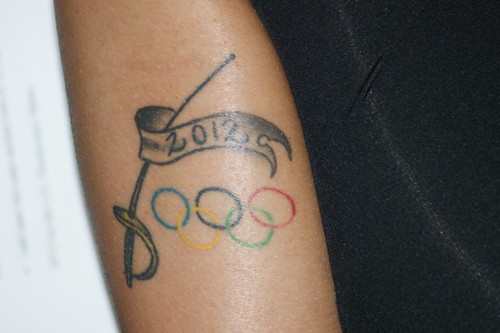
Two years ago, atGeist.com featured an article on a 13-year-old fencing phenom who had just switched to wheelchair fencing from able-bodied fencing. Cat Bouwkamp’s goal at that time was to compete in London at the Olympics. Her goal is becoming a reality. Cat was one of the first athletes to qualifY for the 2012 London Paralympic games this August.
Listed as one of the Top 12 Paralympic athletes to watch, Cat is the youngest fencer on the team. Cat is also the only female on the USA Paralympic fencing team to qualify. Her sponsors include Nike and the Rehabilitation Hospital of Indiana.
This summer, Cat will first compete in the Fencing World Cup in July in Warsaw, Poland. Next, she will attend the Paralympic opening ceremonies in London, with the Queen, on August 29. Her event, foil, will be held on September 4, after she begins her junior year at Fishers High School.
“Life is full of obstacle illusions.” – Grant Frazier. Nothing could be closer to the truth for Cat. Born with fibular hemimelia in her right leg, she endured multiple surgeries. Naturally right-handed, and with her right ankle being a fixed joint, she had to become ambidextrous and fence with her left arm. As she and her peers matured, the challenge with her leg became more pronounced. Her talent and potential was recognized by wheelchair judge, Sean Schumate, whom Cat deeply admires and respects.

Where others see a limitation, some find an opportunity. Schumate and the National Paralympic Coach, Maestro Les Stawiki, approached Cat with the idea of switching to wheelchair fencing. Cat and her parents, Alan and Janet Bouwkamp, carefully considered the switch.
The bottom line of their decision process was that wheelchair fencing leveled the playing field. Once seated in a competition, competitors are at an arm’s length away and held in a fixed position. Arguably, this is the most aggressive form of the sport. Whereas during an able-bodied match fencers are able to shuffle backward, if only for a moment, in wheelchair fencing, the brain/body reactions must be instantaneous. There is nowhere to hide, not even for a nanosecond.
Switching to wheelchair fencing has opened up a whole new world to Cat. She has friends all over the world who share her ethic of good sportsmanship and, like her, have overcome challenges to be where they are. Cat is a golden girl, regardless of the results in London.
Cat Bouwkamp is a member of Indy Sabre. She can be followed on Twitter, ESPNHS, and PBS Medal Quest.






Comments 1
correction: the coach's name is "Stawicki," not "Stawiki." This makes a difference in how it's actually supposed to be pronounced.